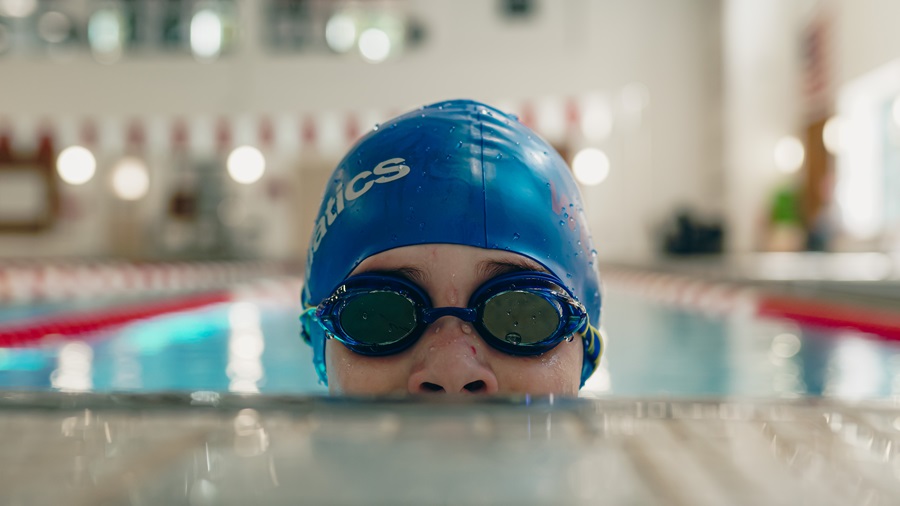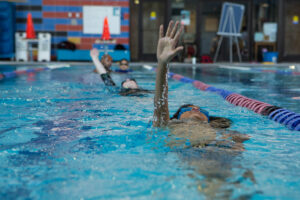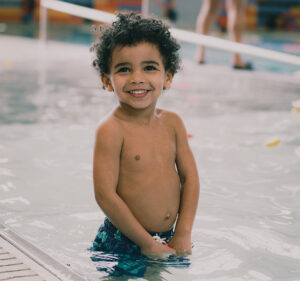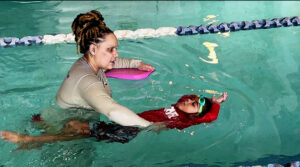Relieve Your Swim Anxiety with Gradual Water Exposure and Support
Over 55 percent of people worldwide over the age of fifteen cannot swim unassisted. What’s at the root of why so many adults cannot swim? Fear. Research shows 46 percent of adults are afraid to swim in deep water, and 32 percent of people are scared to put their heads underwater.
Further studies reveal that children who did not immerse themselves fully in water by age nine were more likely to have a water phobia by age eighteen.
Fear of water, or “aquaphobia,” is a common phobia, and it prevents many people from learning to swim or enjoy water activities. But this fear is something anyone can overcome…with the right tools!
WeAquatics is here to help you gain confidence in and around water. At any age. So, let’s explore the causes of aquaphobia, its symptoms, and proven approaches to overcoming the fear of water.
What Is Aquaphobia?
Aquaphobia, or fear of water, can range from mild hesitation around water to full-blown panic attacks at the sight or thought of swimming or being in the water.
This common fear stems from diverse sources. By understanding the roots of your water phobia, you can begin to manage your fear of water and swimming.
Aquaphobia has many potential causes, including:
- Traumatic experiences, such as nearly drowning.
- Lack of exposure. Without early swimming experiences or opportunities to be around water, the environment can seem scary.
- Cultural beliefs. In some cultures, myths persist about the dangers of water.
- Accessibility. Growing up in regions far from oceans, lakes, and access to pools limits the opportunity to become comfortable in and around water.
- Family upbringing. If siblings or parents fear water, children can absorb the same anxiety around swimming.
- General anxiety tendencies. If you are already prone to anxiety, that might extend to a fear of swimming.
Aquaphobia can have concrete consequences. Having a fear of water can put you and others at a greater risk of drowning. (Statistics show drowning is the leading cause of accidental death.) Overcoming aquaphobia by learning to swim and developing essential water safety skills equips you to handle emergency water situations.
Whatever drives your aquaphobia, overcoming your fear of swimming and finding comfort in the water are possible.
Relaxation Techniques for Relieving Swim Anxiety
When you feel water-related anxiety, relaxation techniques can help you regain control and feel empowered.
Here are proven methods to keep your cool in and around water:
Deep breathing. Inhale slowly through your nose for five seconds, hold for two seconds, and exhale gradually through your mouth for five to seven seconds. Repeat until you feel calm.
Progressive muscle relaxation. Tense and relax muscle groups one at a time from head to toe to reduce overall tension.
Guided imagery. Picture yourself swimming calmly and confidently in a safe environment to override your fearful subconscious thoughts.
Mindfulness. Notice anxious thoughts without judgment. Then, refocus on the sensations you feel in the present moment.
Mastering relaxation gives you the confidence to approach water activities and make them a part of your regular routine.
Gradual Exposure
One of the most effective ways to overcome your fear of water is by repeatedly exposing yourself to pools and other water environments under safe conditions. This allows you to build confidence and to retrain your mind to view water as safe and enjoyable.
Here are some tips to get started:
- Begin in shallow water or a baby pool. This allows you to stand up securely. Work your way gradually toward deeper water.
- When practicing submerging your head underwater, use goggles so you can open your eyes.
- Take swim lessons to properly learn water safety, swim strokes, and breathing techniques. This builds practical skills that help you gain confidence.
- Swim with a knowledgeable and supportive friend who understands your fear.
Develop a Lifelong Love of Swimming
Regardless of your current fear of water, you can overcome it and enjoy swimming safely with the right support, relaxation techniques, and gradual exposure to water.
Overcome your anxiety about water by participating in water activities in an environment where:
- It’s OK to have fear.
- The water is a comfortable temperature (most pools have a temperature between 81 degrees and 84 degrees). The more you move around in the water, you realize how warm it actually is.
- There is no pressure to perform.
WeAquatics is your partner in overcoming you swim anxiety. Certified instructors work with all ages in weekly one-on-one classes to achieve each student’s personal swim goals. In these individualized classes, you learn essential water safety skills and develop a love of swimming…that can last for generations!





